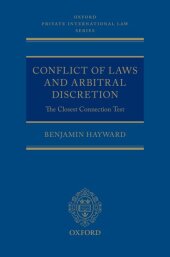 Neuerscheinungen 2017Stand: 2020-02-01 |
Schnellsuche
ISBN/Stichwort/Autor
|
Herderstra▀e 10
10625 Berlin
Tel.: 030 315 714 16
Fax 030 315 714 14
info@buchspektrum.de |

Benjamin Hayward
Conflict of Laws and Arbitral Discretion
The Closest Connection Test
2017. 380 S. 236 mm
Verlag/Jahr: OXFORD UNIVERSITY PRESS 2017
ISBN: 0-19-878744-8 (0198787448)
Neue ISBN: 978-0-19-878744-0 (9780198787440)
Preis und Lieferzeit: Bitte klicken
This book identifies the difficulties that result from resolving conflicts of laws through unconstrained arbitral discretions. It establishes that a bright-line test would be a preferable way to resolve arbitral conflicts of laws. Specifically, it recommends a modified Art. 4 Rome Convention rule as the ideal basis for law reform in this area.
Arbitration is the dispute resolution method of choice in international commerce, but it rests on a complex legal foundation. In many international commercial contracts, the parties will choose the law governing any future disputes. However, where the parties do not choose a governing law, the prevailing approach in arbitration is to afford arbitrators broad and largely unfettered discretion to choose the law considered most appropriate or most applicable. The
uncertainty resulting from this discretion potentially affects the parties┤ rights and obligations, the performance of their contract, the presentation of their cases, and negotiations undertaken to settle their disputes.
In this text, Dr Benjamin Hayward critically reviews the prevailing approach to the conflict of laws in international commercial arbitration. The text adopts a focused and detail-oriented analysis - being based on a study of more than 130 sets of arbitral laws and rules from around the world, and drawing heavily on arbitral case law. Nevertheless, it remains both practical and accessible, taking as its focus the needs and expectations of commercial parties, who are the ultimate users of
international commercial arbitration.
This text identifies the difficulties that result from resolving conflicts of laws through broad and unconstrained arbitral discretions. It establishes that a bright-line test would be a preferable way to resolve arbitral conflicts of laws. Specifically, it recommends a modified Art. 4 Rome Convention rule as the ideal basis for law reform in this area of arbitral procedure.
Conflict of Laws and Arbitral Discretion: The Closest Connection Test, is an excellent, much-needed, well-written, well- argued book. It provides an illuminating outline of the existing practice of international commercial arbitration and offers a comprehensive argument on how to improve it. The broad community of international arbitration and conflict of laws practitioners and scholars around the world should be thankful Dr. Hayward for that. Sagi Peari, University of Western Australia Law Review
Dr Benjamin Hayward is a Senior Lecturer in the Department of Business Law and Taxation, Monash Business School, at Monash University. Dr Hayward┤s teaching and research is focused on international commercial law, particularly international commercial arbitration law and the international sale of goods, and he has previously published in both areas. His teaching and research work has been recognized by the receipt of six university awards since 2010. Dr Hayward has
presented his work at seminars and conferences both in Australia and internationally and he has a particular interest in the interactions and applications of law in international commercial arbitration.


